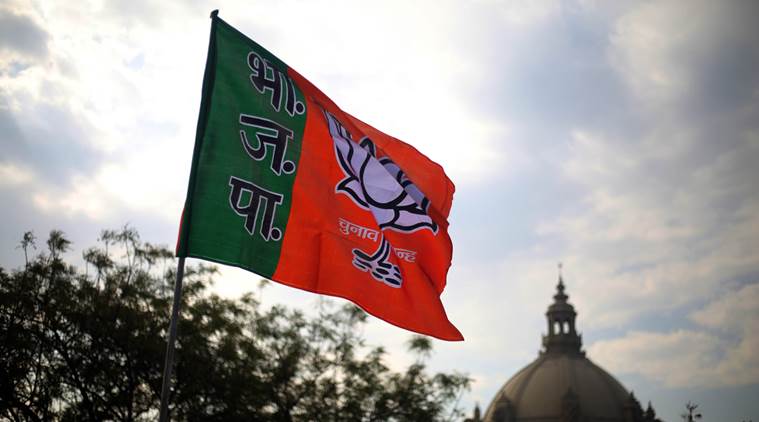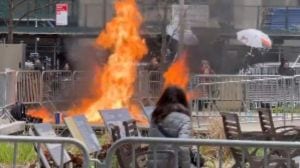- India
- International
BJP is attempting to use citizenship issue to woo Namasudra community in Bengal
Identity issues have not made any remarkable impact on the mainstream electoral politics in Bengal. But the current elections seems to have brought identity related concerns to the centrestage.
 The Namasudras, who constitute the second-largest Scheduled Caste group in Bengal are crucial to the electoral calculus in Nadia and North 24 Parganas, where half of the community is concentrated.
The Namasudras, who constitute the second-largest Scheduled Caste group in Bengal are crucial to the electoral calculus in Nadia and North 24 Parganas, where half of the community is concentrated.
It is generally believed that unlike other states of India, caste and religion don’t play a significant role in West Bengal’s electoral politics. Academic literature often articulates this as West Bengal’s “exceptionalism”. As a result of the electoral decline of the Left Front and some limited attempts by the Trinamool Congress at community-based mobilisation, the so-called exceptionalism thesis has come under some critique. Even then, it is largely acknowledged that identity issues have so far not made any remarkable impact on the mainstream electoral politics in the state.
In this context, the upcoming electoral battle in West Bengal assumes special significance. It seems to have brought identity related concerns to the centrestage of mainstream politics. It is interesting that such concerns are not being conveyed in the language of caste or religion but in the apparently secular idiom of citizenship. The BJP is promising the revival of the recently lapsed Citizenship Amendment Bill, 2016, despite the massive backlash it faced in the Northeast. The Bill proposes to confer citizenship upon all Hindus, Jains, Sikhs, Christians, Buddhists and Parsis who have migrated to India from Bangladesh, Pakistan and Afghanistan as refugees.
Politically, this Bill is directed at wooing the powerful Namasudra caste group who mostly belong to the Matua sect, originally hailing from Bangladesh. The single point demand of their organisation, Matua Mahasangha, is the repeal of the 2003 Citizenship Amendment Act, which denies citizenship to those who have migrated after March 25, 1971 — a large number of them are Namasudras. The family of the founder of the Matua sect, Harichand Thakur, enjoys religious authority over the community as well as control over the Matua Mahasangha. In the 2009 Lok Sabha elections and the 2011 assembly elections, the TMC gained the tacit backing of the Mahasangha then led by the spiritual head of the community, Boroma Binapani Devi, who passed away a few months ago. Thereafter a bitter feud within the first family of the Matuas broke out, which has now turned political. Currently, one section of the Mahasangha led by Mamtabala Thakur, the daughter-in-law of Boroma, has aligned with the TMC while other section is led by Shantanu Thakur, the grandson Baroma is backing the BJP. In the upcoming elections, Mamtabala, the current TMC MP from Bongoan constituency will fight against her nephew Shantanu, a BJP candidate.
Since 2014, the BJP has been trying to gain political mileage by making a distinction between refugee and infiltrator. This involves a political strategy to exhibit favourable disposition to Hindu migrants, mostly Namasudras, by treating them as persecuted refugees. This strategy helped the party to win the Namasudra dominated Basirhat (south) constituency in 2014. But the party’s Namasudra outreach hit a roadblock when lakhs of Bengali Hindus, many of whom Namasudras, got excluded from the draft list of the NRC in Assam. The Matua Mahasangha organised massive demonstrations against the NRC.
The Namasudras, who constitute the second-largest Scheduled Caste group in Bengal are crucial to the electoral calculus in Nadia and North 24 Parganas, where half of the community is concentrated. Prime Minister Narendra Modi chose Thakurnagar, the headquarters of Matua Mahasangha, to start BJP’s campaign in Bengal and made a strong pitch in favour of the citizenship bill. He also paid a visit to Baroma and touched her feet, a hugely significant symbolic gesture, which did not go unnoticed. In his address he urged Mamata Banerjee to back the Bill for the sake of the Matuas. This has created an enormous dilemma for the TMC. While support for the Bill will antagonise the Muslims, a vital support base of the party, opposition to the Bill may push the Namasudras towards the BJP. What has made the situation trickier for the TMC is the recent surfacing of a letter purportedly written by Baroma which appeals to Banerjee for her support for the Bill. But the TMC has challenged the authenticity of the letter. Its opposition to the Bill is attributed to an attempt to consolidate the Muslim support. In this backdrop, the controversial use by the party of Bangladeshi actors in poll campaign has been interpreted by its opponents as Muslim appeasement and infiltration-friendly attitude. This has again given ammunition to the BJP to consolidate the support of the majority community particularly in the border districts.

In the long run, such politics may have unanticipated dynamics. Political lexicons and patterns of mobilisation, that accommodate communitarian concerns, could gain currency.
This article first appeared in the print edition on May 3, 2019, under the title ‘Caste politics, secular idiom’. The writer is assistant professor of political science at Hamdard Institute of Legal Studies and Research, Jamia Hamdard, New Delhi.
EXPRESS OPINION
More Explained
Apr 19: Latest News
- 01
- 02
- 03
- 04
- 05









































